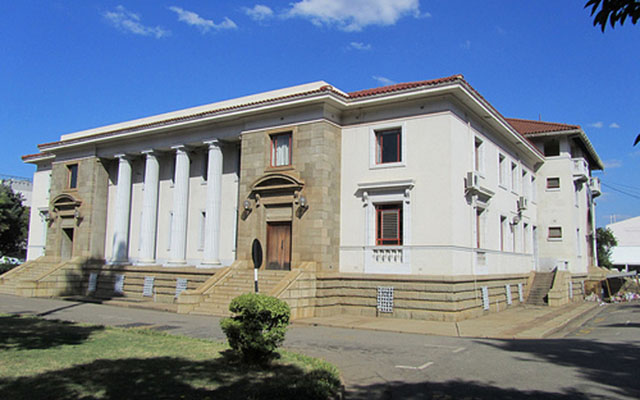Home-seekers conned in land deals


People are taking advantage of the spacious land tracts in communal lands to dupe desperate home seekers
Leroy Dzenga Features Writer
The search for residential space in and around Harare has turned into a craze of some sort, with every family striving to get a place they can refer to as theirs.
Those who fail to get residential stands in Harare are opting for surrounding communal areas like Seke, Domboshava and Goromonzi.
Attracting factors include proximity to Harare Central Business District, which allows daily commuting, cheap land and generous portions of space.
These lucrative bargains have also resulted in a fair share of tears, as barons have invaded the areas.
In 2014, a middle aged man looking for spacious land for his family got a rude awakening as he fell prey to illegal land merchants.
Doubt Isala was introduced to Sylvia Savanhu by his wife in 2014, and the latter offered him a residential stand in her Seke communal lands.
Charmed by its proximity to Chitungwiza and Harare, Isala jumped at the generous offer, only to realise that he was being sold dreams.
“I met Sylvia Savanhu through my wife and she told us she was selling a portion of their communal land for $4 000,” said Isala. “Since we were looking for a decent place to farm and settle, we decided to use our savings to acquire it.”
As Isala finalised logistics to start building, an unexpected twist emerged.
He was told that Sylvia Savanhu had sold the family land to him without her kinsmen’s approval.
“After I saw that I had been sold a dummy, I opened legal proceedings against her,” he said. “The trial revealed that she had sold the land to around 39 people in the same manner.”
Sylvia Savanhu was convicted and sentenced to nine years in jail with more cases yet to be heard.
Isala’s passion to provide a safe haven for his family was not deterred by this misgiving.
He approached Christopher Savanhu, Sylvia’s brother and headman.
“I asked for land in a procedural way after I had learnt the hard way that land in communal lands is not sold,” he said.
Upon hearing Isala’s plea and cognisant of his ordeal, Savanhu offered him land in the area, but this was subject to the approval of the Village Development Committee.
According to Isala, the Village Development Committee was refusing to grant him residency in the area.
“When I started clearing the land I had been allocated, the VIDCO vice chairman Robert Manhombo came to me saying that I shouldn’t have reported Sylvia Savanhu to the police,” he said.
Isala faced animosity from the VIDCO official who promised him that he will face challenges in his quest to settle in the area.
“They told me that they wanted to use the land and I should have consulted them first before going to the headman,” he said. “I remember seeing him when Sylvia’s case was in court and I suspect that they were working together.”
Again, Isala had to seek reprieve from the courts as he took the matter to Chief Seke’s court.
Chief Seke ruled that Isala had a right to the land and could stay, as long as the headman rubber stamped his claim.
The headman approved Isala’s request.
“This man was duped and instead of going away he decided to follow proper process,” said Headman Savanhu. “I had no reason to turn him away.”
Headman Savanhu says he is not worried about the VIDCO’s erraticism since he gave land to Isala in accordance with the law.
“Since I became headman in 1998, this is the first time I have given someone land,” he said. “It is because I believe that the man will bring progress to our area.”
Headman Savanhu further suggested the possible dissolution of the VIDCO committee, as it was sabotaging progress for personal gain.
The ordeal that Isala went through is taxing, but that has been the case that a number of home seekers have endured.
In Zimbabwe, it is illegal to sell communal land between private individuals without the approval of a minister.
Chapter 3 (iv) of the Communal Lands Act states “Communal Land shall be vested in the President, who shall permit it to be occupied and used in accordance with this Act.”
This means that there is no total ownership of communal land, the President is the steward and people can use it, but have no legal standing to sell it.
Sadly, very few people are informed on this technicality and are being sucked into illegal land sales, losing their hard earned money in the process.
The traditional leadership in the Seke area is complaining over the prevalence of land cases and disputes.
Chief Seke says the greater number of cases they have been hearing lately are related to land sales.
“I think these residential stands cases constitute 60 percent of all cases we deal with,” he said. “There is total mischief in Seke.”
Chief Seke had no flattering words for the council which seems to be perpetuating the culture.
“I blame the council; they have failed to execute their mandate,” he said. “They are inciting people to sell State land. They are busy promising people that Seke is urbanising, while they benefit from illicit land sales.”
Chief Seke added: “The council has been clandestinely telling people that Seke is on the verge of urbanising and this has created a rush to sell space. Some people are losing their fields in these so-called sales.”
Chief Seke argued that Seke should be urbanised in a procedural manner.
“We want the council to remove the idea that Seke is a municipality,” he said. “It is a communal land, that can only change through the proper channels. In Kuora, they are pegging residential stands in people’s fields, where do they expect them to plant? It is ridiculous.”
For Seke to be turned from communal land to urbanised land in accordance with the Communal Land Act, there is need for a statutory instrument to be effected.
And seemingly, it has not been issued.
An official from the Ministry of Local Government, Public Works and National Housing said communal land is not transferable between individuals.
Permanent Secretary in the Ministry Engineer George Mlilo said communal land sales were illegal.
“Communal land belongs to the State and it cannot be sold because there are no deeds for the land in question,” he said.
People who are buying the land out of ignorance are likely not to recover their money.
“People are just robbing each other, but there is no financial value to communal lands,” said Eng Mlilo. “Even if you build on it, it cannot later be resold because they do not have purchase value.”
If an area is to be turned into an urbanised residential area, there are procedures that are followed, as well as a proper settlement plan.
In the absence of these key elements, there is a high likelihood that the sale may be dubious in nature.
There a is problem in the heterogeneous approach to housing, as it creates a haphazard settlement, potentially hard to rectify when the regularisation processes commence.
That is the same approach that created the nucleated dwellings in some areas of Harare South.
Town planning experts said urbanisation cannot be wished away, it just needs to be executed in a systematic manner.
Renowned town planner and local governance expert, Mr Percy Toriro, said there should be a rational approach to the demand for urban housing, lest people are exposed to abject poverty.
“It must be known that urbanisation comes with its peculiar settlement problems,” he said. “Issues such as trunk roads, water and sewerage infrastructure, housing and employment, all must be developed simultaneously with the urbanisation, otherwise we end up with pockets of poverty.”
Once the communal lands are turned into urban settlements, the question of sustenance methods comes to the fore.
“In rural areas, people can survive without money by growing own food and harvesting natural resources for survival,” said Mr Toriro. “The same cannot be said of urban areas where food, transport, housing, heating, rates and other expenditures mean one has to have a regular source of income to live in urban areas.”
Mr Toriro added; “This is why town planning is important: It ensures that these artificial environments have a balance of living areas, transport corridors, employment areas, shopping areas, recreational areas, and institutional areas in correct functional proportions.”
Harare South has been a bad example of urban expansion, and Mr Toriro said it would be tragic if communal lands surrounding Zimbabwe follow the same course.
“Sadly, some of the expansion around Greater Harare has been ad-hoc and therefore haphazard.”
“Whilst we cannot run away from urbanisation as it is a global phenomenon, we can at least plan properly so that there is sustainability in the urban expansion.
“Without sound planning, we risk creating slums where we condemn our people to unsustainable living,” he said.
When the settlements are not well thought out, the environment is not spared.
Urban areas are dense settlements where, due to the intense competition for different land uses without careful planning, residents are exposed to many hazards.
“Poor services which become expensive to regularise, poor drainage leading to flash floods even with minimal rains, inefficient transport movement causing congestion and poor safety and there is also a risk of communicable diseases,” Mr Toriro said.
Perhaps the best way to respond to the growing demand for housing will be to change the approach and invest in high rise buildings, as suggested by President Mugabe recently.
Rural sprawling will lead to more tears as unscrupulous dealers seem to have set their roots in some areas.
Feedback: [email protected]








Comments